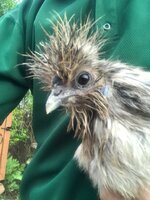Chris Hernandez
Chirping
- May 17, 2017
- 85
- 45
- 88
I have a splash silkie hen that when I got her had a huge crest. Eventually one day she got it all dirty and I had to clean it, some of the stuff didn't come off but she molted around November so I figured it would grow back, she still hasnt gotten her feathers and I have a show that I signed her up for in 3 weeks. I need her to look like when I first got her but I'm not sure if thats going to happen. She is living on pine shaving and I don't let her out in the dirt a lot anymore because she gets really dirty. Anything I should do please let me know. Pictures are from when she was really dirty, when I first got her, and a current picture.



